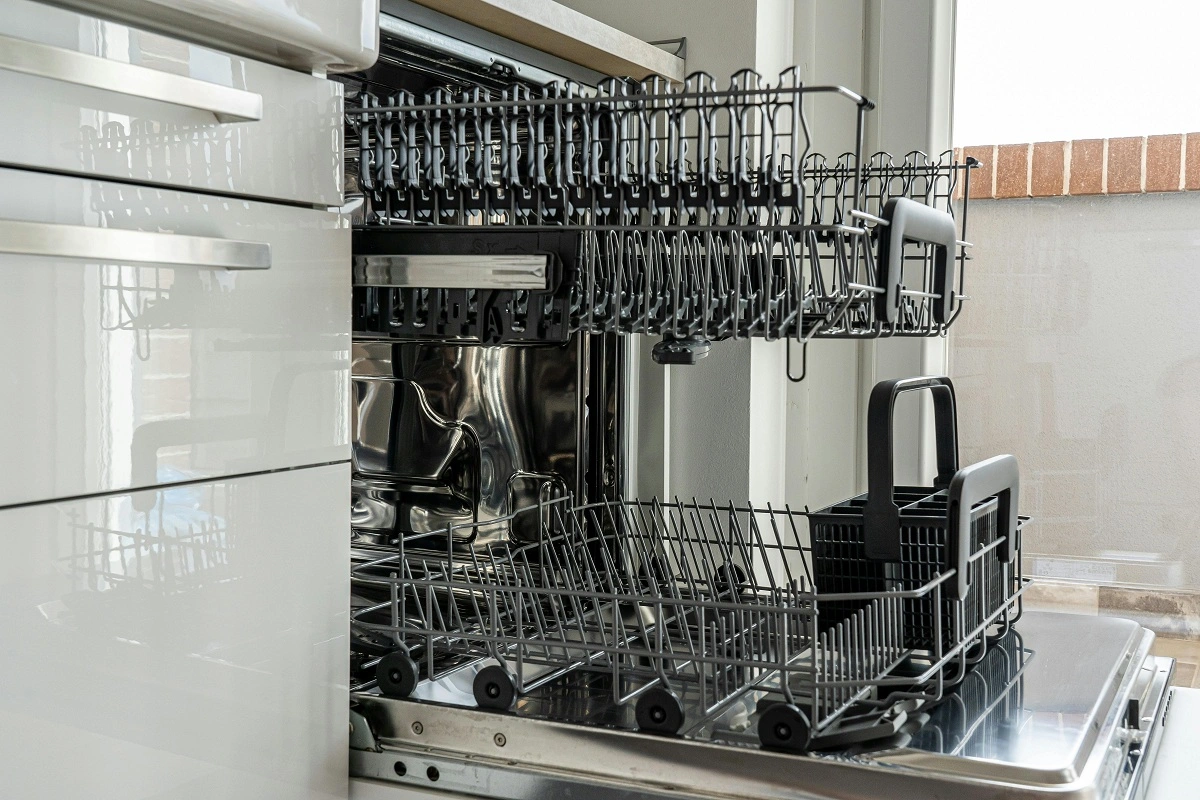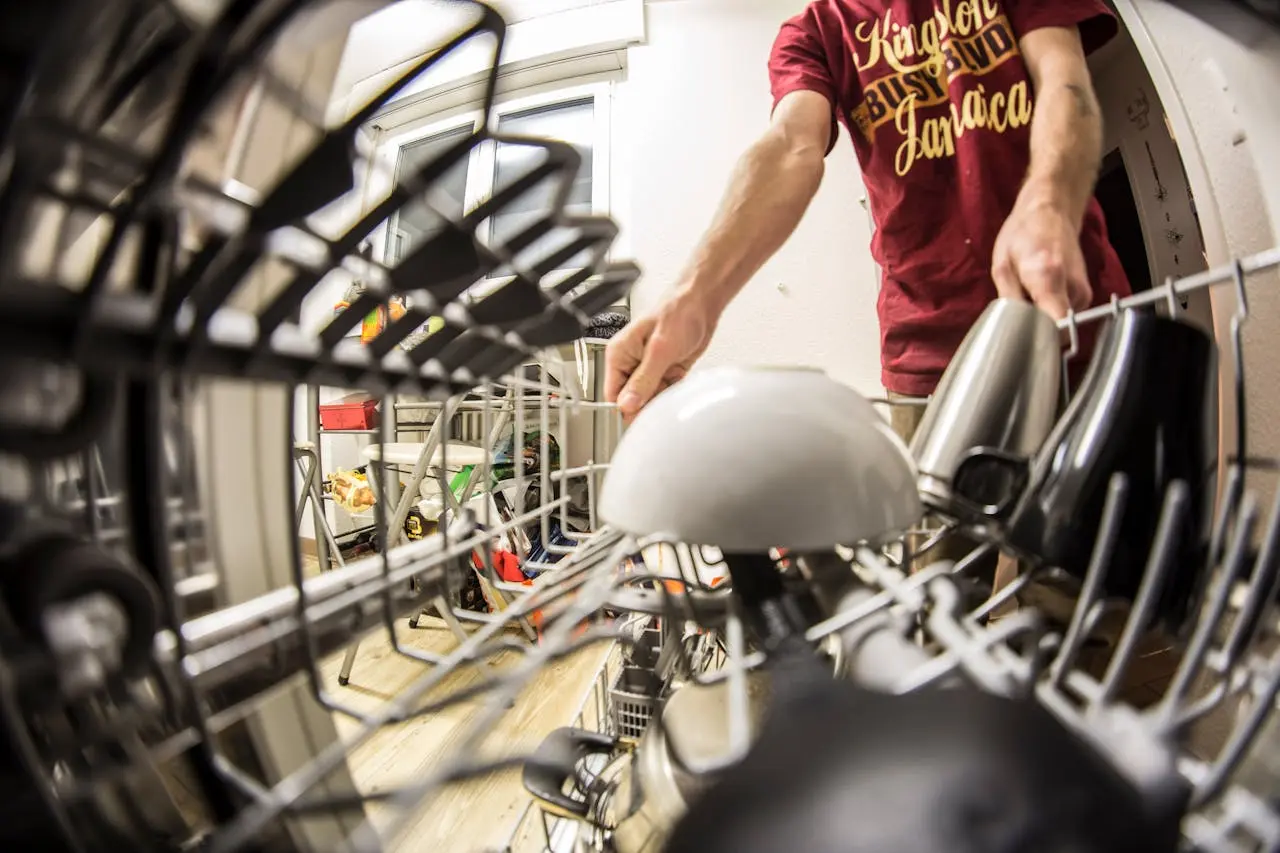If you have never used a dishwasher before, they seem like magic. They hide all those nasty, dirty plates away out of sight. Hence, your house looks instantly cleaner, like you had a professional domestic cleaner around so flies (and badly behaved cats) aren’t attracted to the scraps left on the crockery and spread disease. And they save you about twenty minutes or more daily by getting your dishes spotlessly clean. And, according to one study, they do a better job of getting things clean (even if you’re hyper-meticulous) so you’ll have a healthier home.
Despite their initial appearance, dishwashers are actually quite simple to use. They rely on a strong alkaline powder to clean your dishes, and while they may use a bit more electricity and hot water, the time and effort they save you are well worth it. If you’re new to using a dishwasher, the instruction books that come with them can provide some guidance on how to load them, making the process even easier for you.
Before loading your dishwasher, it’s essential to check all items. Some may not be dishwasher safe, and others may have specific loading instructions. Following these guidelines will prevent mishaps, such as melted plastic or warped kitchenware, and keep your dishwasher running smoothly.

Dishwasher Usage Tips
- Washing massive saucepans in a dishwasher is probably not the best idea, as they take up too much space.
- The most economically efficient way to run a dishwasher is to run only full loads and, if possible, use a lower temperature setting. This also applies to washing machines.
- Don’t expect miracles. You should scrape and rinse the excess plates and saucepans first. Filthy pots and pans with burnt-on bits should be soaked overnight, rubbed and rinsed before entering the dishwasher. This will also mean you can avoid using the heavy-duty cycle on your dishwasher, which helps conserve power. After all, if only one pot needs heavy-duty treatment, why do you also need to wash the knives and cups on heavy-duty? As a hint, a tiny dash (half a teaspoon) of dishwasher powder does wonders for burnt-on bits when added to the soaking water overnight. You only need to use cold soaking water.
- For those who are environmentally conscious, you can make your dishwasher powder an eco-friendly cleaning product with fewer toxins. By mixing borax and baking soda, and using white vinegar for the rinse cycle, you can ensure a clean and sterile wash. While it may not make everything as sparkling, the water does most of the work, giving you peace of mind about the safety and environmental impact of your dishwasher use.
- If you stick with conventional powder, letting the dishwasher cool down before you open it to unload will release fewer toxins into your environment. This avoids the alkaline-laden steam released into your face when you open it.
- Store conventional dishwasher powder out of the reach of children, as it is hazardous—more so than the liquid used for washing dishes by hand.
- You can cut costs and chemicals by not using the rinse aid. All this does is put some extra sparkle on your glasses. If you skip it, everything will still be clean and hygienic.

Don’t Put These Items In The Dishwasher
If you have lived most of your life with a dishwasher, you probably learned what does and doesn’t go into this machine around the same time as you learned your ABCs, if not before. And you probably take your dishwasher for granted. If you have only recently been introduced to these magnificent machines, they will seem like utter magic as they take the load of washing dishes off your back.
However, they don’t completely take this load off your back. Nor can you kiss your rubber gloves, scouring pad, and long-handled dishwashing brush goodbye. Some things can’t go into the dishwasher. A dishwasher’s ability to clean ordinary plates, knives, and cups seems like magic, but a dishwasher cannot do miracles.
Some people prefer not to load and unload the dishwasher themselves, so they find a local cleaning company to send a domestic cleaner.
- Don’t put heavily soiled items in the dishwasher. If you do, the dishwasher will blast the gunk from the porridge pot all over the drinking glasses. Before going into the machine, everything should be rinsed off under the tap – a quick blast is all needed. If you still see masses of gunk on whatever it is, soak the item overnight to loosen it. Tip for saucepans with burnt-on stuff: put a little (about ¼ teaspoon) of the dishwashing powder into the saucepan and the soaking water. This helps loosen the gunk. After soaking, scrape the gunk out.
- If you are lucky enough to own cutlery with ivory handles (it had better be antique or vintage – ivory is somewhat on the hit list for naughty items from endangered animals alongside furs from baby seals), don’t put these in the dishwasher. Some ivory-handled items are supposedly dishwasher safe, but it’s best to be on the safe side and wash these by hand. It won’t take you long!
- While you should rinse or wash out tins, glass jars and the like before putting them out for recycling, you should not put them in the dishwasher. Yes, I know these jars are often only lightly soiled, but they have paper labels. Your dishwasher will likely whip off the paper labels and blast them all over the rest of the wash load in the form of annoying papier-mâché. It’s like putting your jeans into the washing machine with pockets full of tissues – don’t do it!
- Some types of plastic don’t like the bottom shelf of dishwashers and can only go in the top drawer. This is all very well for smaller items like plates and cups, but if you, like me, own a larger item made of this type of plastic, it may not fit on the top shelf. Don’t risk it in the bottom drawer—wash it by hand.

